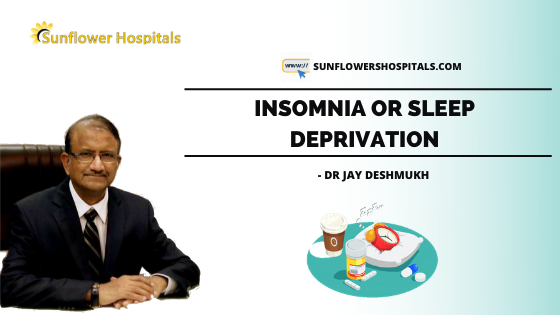Insomnia is defined as difficulty falling asleep. This I also includes difficulty staying asleep or waking up early in the morning and not being able to return to sleep. People with insomnia sleep less or sleep poor-ly despite having an adequate chance to sleep. Poor sleep causes difficult functioning during day time. Insomnia is not defined by the number of hours slept because the amount of sleep needed varies from one person to another. In a study on 60,000 Individuals who self-reported sleep duration of fewer than 6 hours there was a high incidence of high blood pressure, type 2 diabetes and lipid disorders. There is Increased incidence of fatal road accidents in individuals who sleep less.
What is sleep?
Sleep is a complex biological process. While you are sleeping, you are unconscious, but your brain and body functions are still active. Important jobs are done by then, that help you stay healthy and function at your best.
So when you do not get enough quality?
it not makes you feel tired the next day but will also affect your physical and mental health, thinking and daily functioning. What are different sleep disorders? There are more than 80 different sleep disorders. However, there six major sleep disorders.
What are these major sleep disorders?
insomnia that is unable to fall asleep and stay asleep. This is the most common sleep disorder In sleep apnoea you stop breathing for 10 seconds or longer and is frequently associated with snoring. In restless leg syndrome, a tingling or prickly sensation and a powerful urge to move them are common. Hypersomnia means unable to stay awake during-• ing the day This includes extreme daytime sleepiness. Circadian sleep disorders, there is a problem with sleep and wake cycles at right times. In Parasomnia one acts in unusual ways while falling asleep. This includes walking, talking or eating during sleep.
What are the basic rules for a good nights sleep?
Sleep only as much as you feel rested and then get out of bed. Keep a regular sleep schedule. Avoid forcing sleep. Exercise or walk briskly for at least 20 min-utes preferably 4 to 5 hours before bedtime. Avoid tea or coffee late evening. Avoid alcohol near bed-time. Avoid smoking especially in the evening. Do not go to bed hungry. Adjust the bedroom environment. Avoid prolonged use of light-emitting screens such as television, mobile, computers or video games before bedtime. Deal with all your worries well before bedtime.
How safe are sleep-inducing medications?
If behavioural therapy does not work then sedative-hypnotic medications are prescribed. The major differences of these medications are how quickly they begin to work and how long the effects remain. Doctors would select the right medications depending upon how quickly they begin to work and how long the effects last.
What are the precautions to be taken or when should they not be used at all?
They should not be used in pregnancy due to an increased risk of birth defects. People with alcoholism, individuals with significant liver, kidneys and lung diseases. Individuals with sleep apnoea should avoid sleep-inducing medications. Individuals who need to make decisions during the night, such as clinicians on-call or single parents caring for children.
What about alcohol and sleep?
People commonly use alcohol as a sleep aid. Alcohol interferes with sleep later in the night. When used on a regular basis over the long term, you can become dependent on alcohol and develop severe insomnia if you stop drinking alcohol. Due to numerous health risks, alcohol is not recommended at bedtime for insomnia.
What is Melatonin?
Melatonin is a hormone produced by the pineal gland situated in the brain. The night levels of this hormone in the blood are 10 times more than during daytime. The nocturnal rise in melatonin plays an important role in the initiation and maintenance of sleep. In age-related insomnia, levels may decrease at night. This may require melatonin in tablet form. This is also used for jet lag victims.
What are the conditions that impact melatonin levels and thus cause disturbances in sleep?
Prolonged use of laptops, tablets, smartphones or television viewing particularly in late evening hours are known to reduce melatonin levels and cause disturbed sleep. What are the risk factors for insomnia? Insomnia is very common during pregnancy. During menopause, night sweats and hot flashes often disrupt sleep. Insomnia increases with age. If you have a mental health dis• order or a physical health problem you can have sleepless nights. Stressful times and events can cause insomnia. Changing shifts at work or travelling can disturb your sleep.
What are the consequences of chronic sleep deficiency?
Long term sleep insufficiency is associated with type 2 diabetes, high cholesterol and hypertension. There is an increased incidence of heart attacks in individuals who sleep less chronically. Sleep is as important to your health as a healthy diet and regular physical activ-ity. Whatever your reason for sleep loss, insomnia can affect you both mental-ly and physically. People with insomnia report a lower quality of life com-pared with people who are sleeping well.

